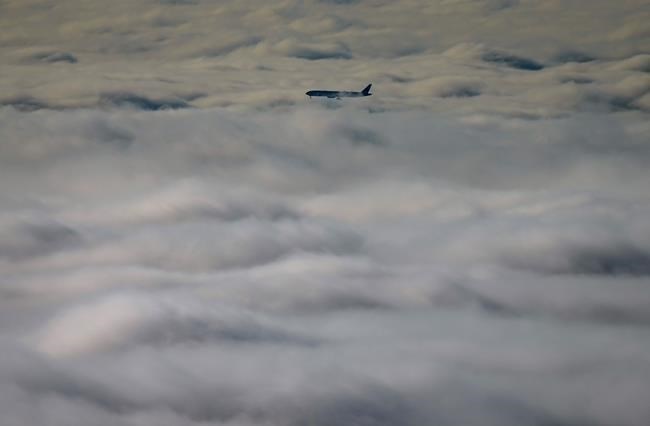
An airplane descends into the fog blanketing the region while on approach to land at Vancouver International Airport, in Richmond, B.C., on Sunday, November 26, 2023. A draft report from a United Nations agency gives Canada a C grade for flight safety and oversight, down from A+.
Image Credit: THE CANADIAN PRESS/Darryl Dyck
December 07, 2023 - 1:46 PM
Canada has received a C grade on flight safety and oversight — down from an A+ and far below most of its peers — according to a draft report from a United Nations agency.
The confidential audit from the International Civil Aviation Organization and obtained by The Canadian Press says the country has fallen precipitously to a score of 64 out of 100, with three safety areas in particular seeing a big drop-off: aircraft operations, airports and air navigation.
Canada's score topped 95 per cent in the UN body's previous report in 2005.
The UN body recommended that the federal government establish a system to lock in full regulatory compliance by airlines and airports, shore up certification related to dangerous goods and ensure proper training and fatigue management for air traffic controllers.
A shortage of air traffic controllers and a trend toward off-loading safety responsibilities from government to industry remain concerns across the continent, said Ross Aimer, CEO of California-based Aero Consulting Experts.
"Every other day you hear there's what we call a near miss. I don't like that term 'near miss;' I would like to call it a near collision," Aimer said.
In September, two Air Canada planes brushed each other on the ground at the Vancouver airport, tearing off parts of their wingtips in a low-speed collision.
In March, an air traffic controller cleared an Air Canada Rouge plane for takeoff from Sarasota, Fla., just as an American Airlines jet made its final approach on the same runway, prompting the American pilot to pull up abruptly — one of a half-dozen incidents of conflicting runway use the U.S. National Transportation Safety Board was investigating at the time.
However, University of Manitoba transport institute director Barry Prentice said Canada's flight safety record speaks for itself, with plane accident deaths down in recent years and no major commercial airline crashes in decades.
"What are the results? I haven't seen much in the nature of safety problems in the airline industry for some time," he said. "That's an indication the system is working well."
The government had until Oct. 30 to respond to the agency's draft audit, and a final report is expected in the coming months.
The report comes amid an ongoing dearth of aviation employees that include air traffic controllers, pilots and baggage handlers, adding to the challenges facing the sector after the COVID-19 pandemic upended it.
The total score measures a given country's "safety oversight capability" based on the UN agency's questionnaires, checklists and on-site visits to industry players, including Air Canada, Nav Canada and the Montreal airport.
Carried out between May 31 and June 14, the audit examines eight areas including legislation, licensing and accident investigations.
In those three categories, Canada notched scores between 67 and 83, though all were down by at least eight points from the previous safety audit.
It ranked below other G7 countries, except for the United Kingdom, in most categories, and also below a majority of the 38 states in the Organization for Economic Co-operation and Development, a club of economically developed countries.
Oversight of aircraft operations saw the biggest plunge, falling to a score of 23 from 88.
Aimer warned of governments' delegating oversight duties to airlines and manufacturers rather than shouldering responsibility for checks and safeguards themselves.
"It's almost like the fox guarding the henhouse. You can't be promoting aviation and yet policing it at the same time," he said.
Transport Canada's mandate is to "promote safe, secure, efficient and environmentally responsible transportation," the department's website states.
For years, Canada has required aviation organizations to comply with frameworks called "safety management systems" (SMS) laid out by the International Civil Aviation Organization. In 2007, Transport Canada said the sector "would henceforth be responsible for the proactive and systematic management of the risks that weigh on its activities, and that the primary tool used to do so would be the SMS, where possible," according to a Library of Parliament analysis in 2021.
Much of the UN agency's 23-page report zeroed in on "comprehensive procedures" and oversight mechanisms within government to ensure regulatory compliance.
The International Civil Aviation Organization directed questions specific to Canada's results to the government.
"The Universal Safety Oversight Audit Programme was created by state aviation regulators to help them prioritize their enhancements to their safety oversight abilities," agency spokesman William Raillant-Clark said in an email.
Transport Canada did not respond immediately to a request for comment.
This report by The Canadian Press was first published Dec. 7, 2023.
News from © The Canadian Press, 2023